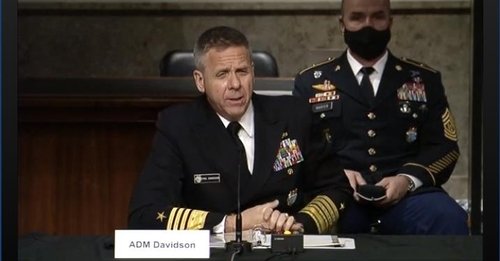 |
The captured image from the website of the US Senate Armed Services Committee shows Adm. Phil Davidson, commander of the U.S. Indo-Pacific Command, speaking at a hearing in Washington on Tuesday. (US Senate Armed Services Committee) |
North Korea poses a serious and most imminent threat to the United States and its allies in the Indo-Pacific region such as South Korea, the commander of US Indo-Pacific Command said Tuesday.
Adm. Phil Davidson also said the North continues to develop its nuclear and delivery systems designed to strike the US homeland.
"North Korea poses a significant security risk to the United States and our partners in the Indo Pacific Region. The country has taken no meaningful steps toward denuclearization, despite promising signs of de-escalation in 2018, and it continues to advance its strategic weapons program," Davidson said in a statement submitted to the Senate Armed Services Committee prior to a Senate hearing.
"Until the nuclear situation is resolved on the Korean Peninsula, North Korea will remain our most immediate threat," he added.
The four-star admiral said the North has continued to develop weapons of mass destruction despite its self-imposed moratorium on nuclear and long-range missile testing that has been in place since late 2017.
"Pyongyang maintains a diverse and growing missile inventory, and North Korea unveiled several new ballistic systems during military parades in late 2020 and early 2021, including two SLBMs and an ICBM," he wrote.
He also noted North Korean leader Kim Jong-un has again taken a "bellicose" stance toward the United States.
"In early 2021 he characterized the United States as the North's biggest or principal enemy as he vowed to strengthen its nuclear arsenal. Kim also identified several new weapon modernization goals in early 2021, to include developing tactical nuclear weapons and hypersonic glide vehicles and improving the readiness and accuracy of North Korea's ICBMs," he said.
"Pyongyang's missile research and development efforts, coupled with its ongoing pursuit of nuclear material and technology, are consistent with the regime's stated objective of being able to strike the US homeland," he added.
Davidson said North Korea continues to evade UN Security Council sanctions via illegal ship-to-ship transfers of goods prohibited under the sanctions regime, such as oil, but also through various other means, including cyber theft.
"Through cyber-enabled financial theft, extortion campaigns, and cryptojacking -- wherein North Korea uses compromised computing resources to mine digital currency -- North Korea raises illicit revenue to support its weapons development programs," he said.
Meanwhile, the top US military official in the Indo-Pacific said the current lack of a Special Measures Agreement between his country and South Korea may undermine the joint readiness of their combined forces.
"The United States and ROK are currently addressing a lapse in the Special Measures Agreement (SMA), which we expect to be finalized in the near term. The lack of an SMA negatively impacts USFK's ability to 'fight tonight,' " he said.
The SMA sets Seoul's share of the cost in maintaining US troops on the Korean Peninsula.
The countries said they have reached a "consensus" on the text of a new SMA in their latest round of negotiations in Washington over the weekend.
They added the deal will be initialed and signed after it is reviewed by their respective governments.
South Korea paid about $870 million as its share of the cost for the upkeep of some 28,500 US troops in South Korea in 2019. The US State Department spokesman, Ned Price, has said the new agreement will be effective for six years. No other details of the new agreement have been made public.
Tuesday's hearing came as the committee is set to hold a confirmation hearing for Adm. John Aquilino, commander of the US Pacific Fleet, who has been tapped to replace Davidson at the Hawaii-based command. (Yonhap)




![[Herald Interview] 'Trump will use tariffs as first line of defense for American manufacturing'](http://res.heraldm.com/phpwas/restmb_idxmake.php?idx=644&simg=/content/image/2024/11/26/20241126050017_0.jpg)

![[Health and care] Getting cancer young: Why cancer isn’t just an older person’s battle](http://res.heraldm.com/phpwas/restmb_idxmake.php?idx=644&simg=/content/image/2024/11/26/20241126050043_0.jpg)

